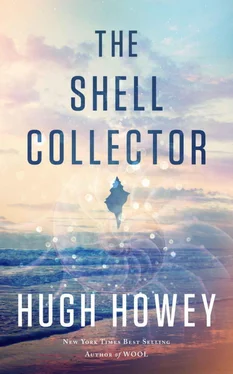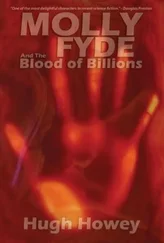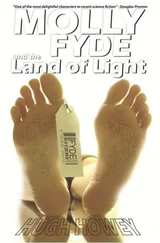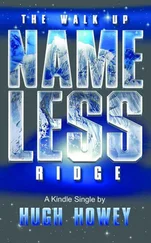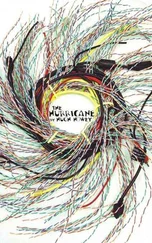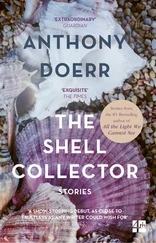Ness laughs. “You’re jumping ahead.”
“Of course I am. I’m a reporter. As much as I look forward to the shelling, I want to know where the murexes came from. I want to see this mythical beach you seem to believe in where extinct shells just roll up with nary a mark on them.”
Ness stops at the bottom of the stairs. Turns to me. “Let’s say you wrote a piece in four parts,” he says. “Each part is thousands of words long. And your readers decide to skip all the way to the last paragraph of the last part and read only that. What would you think?”
“I think that would suck,” I say.
“Exactly,” Ness says. “So don’t suck. Let me show you the whole story. No skipping ahead. Promise?”
I hesitate. Ness gives me that intense look of his, that unwavering gaze. “I promise,” I finally say. And then, perhaps because of the morbid nature of the guest house, I add: “Hope to die.”
“That’s the spirit. And don’t worry, I’m going to show you where the shells came from, but I want you to understand a little history first. See what led me to them. Which means you’re going to have to tolerate my little cliffhangers.”
“I think you probably mean teasers this time,” I tell him. “And I feel like you’re just delaying this because whatever you’re doing with those shells isn’t legal.”
“Oh, it’s not legal,” Ness admits. “It’s highly illegal. But you promised not to jump ahead.”
I’m not sure how I can jump ahead when it’s difficult enough just to keep up. I’m a fast walker. You can’t live in New York City without also being on the cusp of qualifying for the speedwalk event at any given Olympics. And yet I find myself trotting across the boardwalks and taking stairs at an unsafe clip, while Ness seems to casually stroll ahead of me.
“There used to be homes all along here,” he says.
I descend the last set of stairs and find myself back on the beach I visited a few nights ago. I kick off my sandals. Ness and I both have our shelling bags, our hats pulled down tight against the breeze, the smell of sunscreen in the air. Scanning the beach, I see why the bay is so loud. The two jetties of rock—the natural one and the manmade one—funnel the sea up the beach. They also corral the noise, so you get the crash of the ocean as well as the echoes of those crashes. Sound waves pile up like sea waves, overlapping and amplifying. In an east swell, I imagine the break here is amazing. It makes me wish I’d brought my board.
“So did the sea take the homes that used to lie along here, or did you?” I ask Ness. It’s an honest question, but it sounds harsh now that it’s out in the air. As if I mean to say that, either way, his family had a part in clearing out whatever beach communities used to lie here, either by purchase or by environmental ruin.
“The sea took them,” Ness says. “We like to build on the edge, don’t we? Right on the edge of disaster. Because if we don’t, it leaves room for someone else to build between us and whatever it is we desire. We’re all like Icarus in that way.” Ness points toward the natural jetty to the south. “Let’s walk the shell line this way.”
“Icarus flew too close to the sun,” I point out. “That story is about ambition.”
“The story is about understanding nature’s limits,” Ness claims. “It’s about craving more than we can possess. It’s about ego. And don’t forget, it was the sea that killed him. Not the sun. Icarus drowned.”
A periwinkle catches my eye. I stoop to pick it up and add it to my bag.
“There’s a better one just over there,” Ness tells me. He points an impossible distance away. I can’t tell if he sees the shell or if he knows it’s there from being down on the beach earlier that day. I inspect my specimen. It’s the finest shell I’ve picked off a beach in years. The lip is cracked, the crown chipped, a hole straight through the apex, and the interior is dull from too much time in the sun. But it’s gorgeous. Rare. I slip it into the bag.
“A week from now, you’ll step right over that shell,” Ness tells me.
“I hope you’re wrong,” I say. “I don’t want to ever get like that.”
He shrugs. I see a nutmeg and an auger. Both worn. I wonder how long they’ve been bouncing along on this beach, no one here to pick them up, to rescue them.
“Are you old enough to remember when everyone had shelling stories?” Ness asks.
“I’m not much younger than you,” I say. “But thanks for asking.”
He turns and smiles at me. I have to remind myself that his family made their fortune by ruining the world. And while the rest of us agonized over the floods and the erosion and news of every sea life extinction, Ness was at a fancy college, rowing boats, getting into trouble, always smiling, always having a good time, not a care in the world. I am constantly reminding myself of this around him. My story is not going to change. I’m just here to write a second story, the story of the lace murexes.
“So, I have a theory on why we don’t hear shelling stories like we used to,” he says. “Why those stories suddenly stopped a few decades ago.”
“You mean because shells have become vanishingly rare? Because sea life is going extinct?” I stop myself from spelling out the ecological disaster that led to this. Or pointing out that most people don’t have gas-burning cars in their garages any more.
“Good shells have been hard to find for a long time, but when the fad hit, and the magazines for collectors came out, and the stupid shows hit cable TV—the Shell Hunters , Diving for Sand Dollars , all that nonsense—there was a flurry of boasts, but then everyone clammed up. No pun intended.”
“Lightning whelk,” I say, retrieving a half-buried shell and seeing that only the lip is chipped. A stunning specimen. I put it in the higher pocket of my shelling bag so it doesn’t rub against any of the others.
“Nice find,” Ness says. He seems sincere. I note he has yet to pick up a shell. The wind catches the end of his empty bag and twists it and flaps it around. “And then News Journal did their big piece about the value of shells, and within weeks, they all seemed to disappear.” Ness snaps his fingers. “Which isn’t possible. What really happened, I think, is that everyone shut up about their finds. Not just where they found them, but that they’d found anything at all. It was about this time that people started calling what you and I do the latest Dutch Tulip Craze.”
I notice that he lumps us together, me and him, as if our shelling is anything alike.
“People were getting up at four in the morning, three in the morning, two in the morning, and grabbing every shell they could scoop up. Shells kept rolling in, but someone would be there immediately to take them. Nobody trusted anyone else not to follow them to their favorite spot. You remember when just a handful of cars by a remote beach would cause rumors and then traffic jams?”
“I remember,” I say. “My dad used to wake us up in the middle of the night, say he got a tip from a friend, or just had a feeling, or that some storm had just hit the beach, and we’d get dressed, grab our bags and flashlights, and jump in the car. It was the only time he let me eat fast food. That’s what I remember the most, when I was young. Breakfast biscuits in the middle of the night.”
The memory is so clear: my mom and dad in the front seat, me and my sister leaning up between them, my mom telling us to buckle up. I pretend to study the sand, lowering myself to one knee, and wipe my eyes.
“It was twenty years before the shells really thinned out,” Ness says. “I mean, they were dying off before. The reefs were dying long before that. Have you ever been to the Great Barrier Reef?”
Читать дальше
